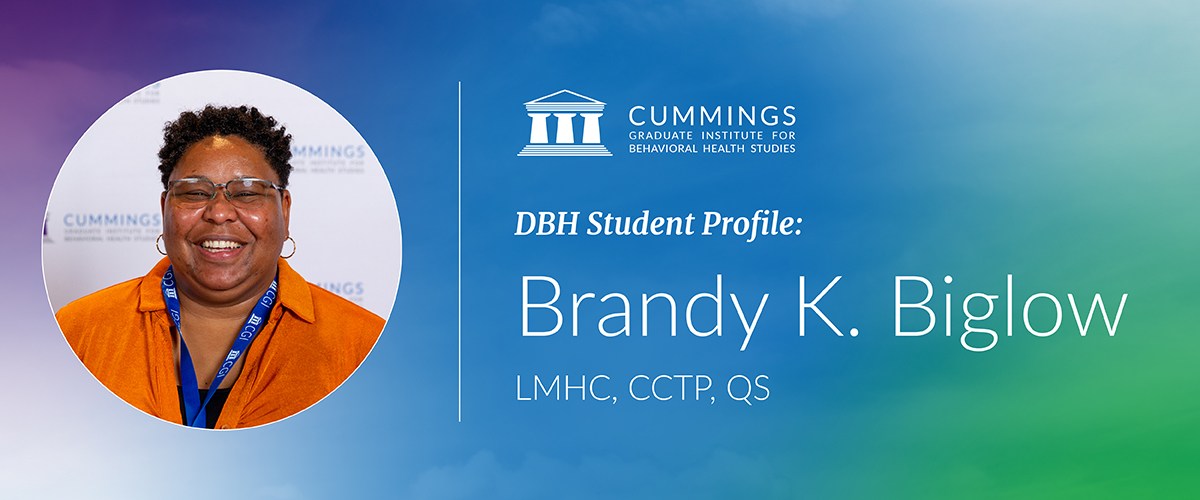 Beyond Burnout: Brandy K. Biglow’s Vision for Behavioral Healthcare Transformation
Beyond Burnout: Brandy K. Biglow’s Vision for Behavioral Healthcare Transformation
Feb. 5, 2024
Meet Brandy K. Biglow, Doctor of Behavioral Health (DBH) candidate at Cummings Graduate Institute for Behavioral Health Studies and the powerhouse behind Renovation Integrative Health, LLC. She’s not your typical CEO—she’s a licensed mental health counselor, a certified trauma expert, and soon-to-be Doctor of Behavioral Health. With an impressive career spanning over two decades, she has transitioned from a teacher of students with exceptionalities to a seasoned counselor, where she improve patient care outcomes by enhancing social-emotional education, providing family resources, and more. Today, she continues her work in this arena and has expanded her expertise to encompass to professional life and group coaching. Passionate about preventing burnout, Ms. Biglow uses humor and current research to positively impact the lives of those she engages with in every encounter. Join us in exploring Ms. Biglow’s professional educational journey through the interview below, characterized a nuanced understanding of integrated care, burnout mitigation, and a steadfast commitment to advancing equitable and quality healthcare.
How has the Doctor of Behavioral Health program influenced or enhanced your approach to addressing behavioral health challenges and making a difference in the field?
The Doctor of Behavioral Health program has been essential in providing me with the tools I need to engage with various stakeholders. The skills I have learned have altered how I interact with my patients, coaching clients, and licensure supervisees. It has provided a framework to address the whole individual more adequately versus only their mental or emotional concerns. As I continue to broaden my horizons, I am secure in the skillset I have acquired to discuss concepts such as health equity, social determinants of health, R.O.I. (monetary, tangible, and intangible), the Quintile/Quintuple Aim, Integrated Care, developing clinical pathways, and so much more. I can confidently consult with healthcare organizations seeking to bring integrated care to their establishments. I am not only a mental health counselor. As a result of the DBH program, I now consider myself a liaison and advocate to help patients and providers have a more positive experience in the healthcare process.
What are your primary professional and academic interests within the realm of behavioral health, and how do these align with your career goals?
 In the next 1-3 years, I want to expand my practice to include consultation services aimed at educating healthcare organizations and providers on how to eliminate burnout at the macro (policies, procedures, senior leadership), mezzo (supervisors, managers, team leads), and micro levels (frontline members and support staff). I will also be developing a curriculum with similar objectives for individuals and groups/teams to engage with in person/remotely with me (or members of my team) in various formats: live, hybrid, or self-paced. In addition, I want to speak at conferences and become an authority on burnout. This aligns with my career goals of helping healthcare professionals and others be healthy and thriving as they seek to serve others.
In the next 1-3 years, I want to expand my practice to include consultation services aimed at educating healthcare organizations and providers on how to eliminate burnout at the macro (policies, procedures, senior leadership), mezzo (supervisors, managers, team leads), and micro levels (frontline members and support staff). I will also be developing a curriculum with similar objectives for individuals and groups/teams to engage with in person/remotely with me (or members of my team) in various formats: live, hybrid, or self-paced. In addition, I want to speak at conferences and become an authority on burnout. This aligns with my career goals of helping healthcare professionals and others be healthy and thriving as they seek to serve others.
In the next 5-15 years, I want to build an all-inclusive integrated health clinic. A one-stop-shop for primary, behavioral health, and some specialty care. I want the clinic to be a place where patients can come to receive equitable and quality care regardless of their education, socioeconomic status, race, sexual orientation, sexual identity, gender, etc. I want it to also be a place where we teach other professionals about integrated care and develop the gold standard for the industry.
Are there any defining moments with your DBH program experience that has shaped your perspective on integrated care?
 During my first class, there was a discussion about how integrated care happens. When I entered the program I thought I would open a behavioral health clinic and have PCP’s join me. I thought patients would come in because of their mental health issues. I quickly and definitively learned, it would not work that way. Patients come to their PCP’s about their physical and mental health concerns. The door to helping people improve their mental health is the PCP office. I was a little saddened by this but did understand it. Due to the stigma that still exists around mental health, people will not seek assistance but they will go to their PCP. It helped formulate the idea around the clinic I want to build. I want people to come for their PCP, women’s health, men’s health, diabetes treatment etc. and then I want to enlighten them to the benefits of having a behavioral health consultant assist them in improving their mental and emotional health as well. I am now a firm believer, there should be a BHC at every hospital, in every clinic, even in the emergency room. I believe it better serves the patients and it also allows for improved population health.
During my first class, there was a discussion about how integrated care happens. When I entered the program I thought I would open a behavioral health clinic and have PCP’s join me. I thought patients would come in because of their mental health issues. I quickly and definitively learned, it would not work that way. Patients come to their PCP’s about their physical and mental health concerns. The door to helping people improve their mental health is the PCP office. I was a little saddened by this but did understand it. Due to the stigma that still exists around mental health, people will not seek assistance but they will go to their PCP. It helped formulate the idea around the clinic I want to build. I want people to come for their PCP, women’s health, men’s health, diabetes treatment etc. and then I want to enlighten them to the benefits of having a behavioral health consultant assist them in improving their mental and emotional health as well. I am now a firm believer, there should be a BHC at every hospital, in every clinic, even in the emergency room. I believe it better serves the patients and it also allows for improved population health.
What drives and motivates you in your pursuit of advancing behavioral health, and how do you stay inspired?
What drives me is a heart for service. I was born to serve. It fuels my soul. Serving and helping is where my heart soars and my spirit is alive. I believe the integration of health is the key to whole body health. What we think, how we eat, how we move, how we sleep, who we socialize with, and more determine our health. As a behavioral health provider, it is my responsibility to serve and help people understand the connectedness of our minds and our bodies.
I stay inspired through acknowledging the wins my patients make in treatment, the progress DBH’s are making in the healthcare field, and the movement happening in healthcare. I recognize the road is long but we are indeed making progress, step by step.
If you could offer advice to your fellow professionals considering the DBH program, what would it be?
This program will change how you present to the world, not just as a professional but as an individual. Understand this is work but the work is worth it and the journey is undeniably transformative. If you are seeking a doctorate for the title, this is not the program for you. If you are seeking a doctorate to interrupt and disrupt the course of healthcare, then this is the program for you. You won’t find a more supportive program with professors who are dedicated to your success and your education. This program is not about the regurgitation of information. It is about the appropriate applied application of knowledge and information to push forward and become an advocate for equitable and quality care for all.
Ms. Biglow’s commitment to disrupting healthcare norms and fostering holistic well-being with a blend of humor and rigorous research, positions her as an indomitable force for change in the healthcare landscape. Her professional and educational journey, serves as a testament to the potential of the Doctor of Behavioral Health program at CGI—a program that not only imparts knowledge but cultivates advocates, disruptors and pioneers who will shape the future of integrated behavioral healthcare delivery and impact. Through her unwavering dedication to serve others, Ms. Biglow leaves an indelible mark, propelling healthcare towards a more equitable and compassionate future.

Connect with Brandy K. Biglow
Facebook: RenovationIntegrativeHealth
Instagram: RenovationIntegrativeHealth
LinkedIn: brandykbiglowlmhcdbh
Renovation Integrative Health, LLC: www.getrih.com
Check Out Brandy K. Biglow on the Disruptors at Work Podcast
Disruptors at Work: an Integrated Care Podcast, Season 3, Episode 1: The Implications of Occupational Burnout on Integrated Care with Brandy K. Biglow, LMHC, CCTP, QS





























